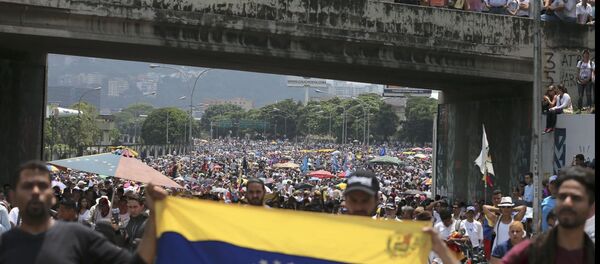Sputnik: Greece was one of the nations who refused to recognise Guaido as an interim president of Venezuela. Why is that?
Dimitris Rapidis: First of all, I’d like to say that Greece from the very first moment stands in solidarity with the people of Venezuela, and it supports democracy and the restoration of social peace in the highly polarized society. The Greek government definitely stands for the non-intervention in domestic affairs of Venezuela; this principle applies to all the global stage.
As for the position of the European Union, actually the Greek side contributed to the final document, which is actually calling for Maduro to go for elections; but at the same time, it wasn’t at all supporting Guaido, who proclaimed himself the interim president of Venezuela. From the last EU Council of Ministers of Foreign Affairs, there’re a number of member states that have actually recognised Guaido as the interim president of Venezuela; but Greece hasn’t done so because we still believe that this intervention group, the discussion group that will meet in the coming days in Montevideo, Uruguay, will provide a positive and peaceful solution on the issues that Venezuela is facing.
READ MORE: Let My People Go: Analysts on Why GOP Throwing Wrench in Trump's Syria Pull-Out
Sputnik: You’ve articulated the rationale and the thinking of the Greek people; obviously, Greece has been through difficult times in the last 10 years or so. How much is the sentiment regarding Guaido shared among Greek politicians?
Dimitris Rapidis: As for the politicians, there is not much interest in what’s going on, to be honest, in Venezuela. There’re some media, mainly backed by the front opposition party, the conservative New Democracy, that are trying to raise this issue in the public debate; but actually, we’re far away from Venezuela, we’re at the farthest corner of the European Union, we’ve got different issues that we’re entangled with. But the fact remains that no matter the geographical distance we have with Venezuela, the government does believe that there must be a peaceful solution in Venezuela and that the European Union has to support this process. They have to support these efforts to restore democracy and to restore the institutions in the country.
Sputnik: Can you explain the EU unity, or supposed unity, in the backing of Guaido in Venezuela? How much are they acting on their will in this situation? Regarding the EU stance, you’ve got Italy, you got yourself; I’ve been listening to various commentators on Twitter who’re saying they’re against this support and intervention as well. So there’re pockets of indifference to this sort of decision by the EU; it’s not a wholesale decision by any means, is it?
The views and opinions expressed in this article are solely those of the speaker do not necessarily reflect those of Sputnik.


